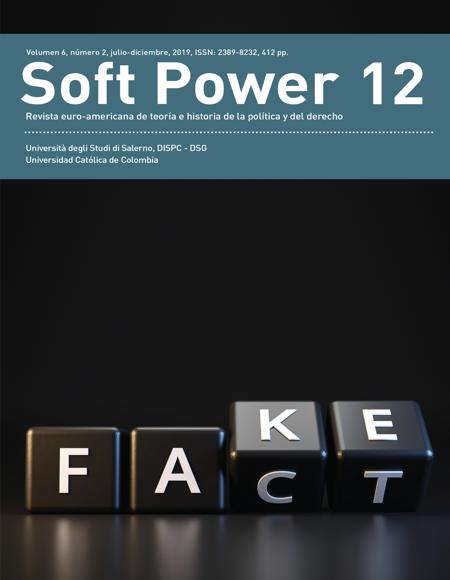Abstract
This article intends to reflect on the Russian populism peculiarity. Indeed, over the years it lost its original feature to be asserted as a hybrid phenomenon combining parts of the contemporary populism with specific aspects of the Russian tradition. The scarce participation of the intermediate bodies, the use of a messianic argument to validate new political projects, and the success of charismatic leaders acting on behalf of people considered an indistinct crowd unable to make its voice heard are characteristics of populistic phenomena featuring of the Russian history as well. The same Putin, although not emerged from a populist platform, converted himself in a reference model for the twenty-first century populist movement perpetuating in his nation a system forbidding the consolidation of a substantive democracy in favour of a strongly personalised authoritarian power.
Keywords

References
Berlin, I. (2008). Pensadores Rusos. México: FCE.
Canovan, M. (1981). Populism. Nueva York-Londres: Hartcourt Brace Jovanovich.
Canovan, M. (1999). Trust the people! Populism and the two faces of democracy. Political Studies, (1), 1-16.
Casula, P. (2013). Sovereign Democracy, Populism, and Depoliticization in Russia: Power and Discourse during Putin’s First Presidency. Problems of Post-Communism, (3), 3-15.
Casula, P. (2017). Populism in Power: Lessons from Russia for the future of European populism. The Dahrendorf Forum. Alemania. Disponible en: https://www.dahrendorf-forum.eu/populism-in-power-lessons-from-russia-for-the-future-of-european-populism/.
Daly, J.W. (1998). Autocracy under Siege: Security Police and Opposition in Russia: 1866-1905. DeKalb: Northern Illinois University Press.
de Pedro, N. (2017). Putin: icono de los populismos euroatlánticos. En E. Woertz (Ed.), El populismo en Europa: ¿de síntoma a alternativa? (pp. 49-52). Barcelona: CIDOB.
Eklof, B., Bushnell, J., Zakharova, L. (Eds.). (1994). Russia’s Great Reforms, 1855–1881, Bloomington e Indianapolis: Indiana University Press.
Fish, S. (2017). What is Putinism? Journal of Democracy, (28), 61-75.
Gorokhovskaia, Y. (2019). Protest and Regional Elections. Russian Analytical Digest, (239), 2-4.
Herzen, A. (1958). Revoljucija v Rossii (La revolución en Rusia). En Kolokol del 1 de Agosto de 1857. Ahora en A. Herzen. (1958). Sobranie Socinenij (Obras Completas). Moscú: Ak. Nauk SSSR.
Laclau, E. y Mouffe, C. (2001). Hegemony and Socialist Strategy: Towards a radical Democratic Politics. London-New York: Verso.
Laclau, E. (2005). La razón populista. Buenos Aires: FCE.
Lassila, J. (2016). Aleksei Naval’nyi and Populist Re-ordering of Putin’s Stability. Europe-Asia Studies, (1), 118-137.
Ledeneva, A. (2013). Can Russia Modernise? Sistema, Power, Networks and Informal Gobernance. Cambridge: Cambridge University Press.
Malia, M. (1972). Alle origini del socialismo russo. A. Herzen, l’intellighenzia russa e la cultura europea. Bologna: il Mulino.
Mény, Y. y Surel, Y. (2004). Populismo e democrazia, Bologna: il Mulino.
Merkel, W. (2017). Por qué perduran los regímenes autoritarios. Nueva Sociedad, (267), 46-52.
Milosevich, M. (2017). Rusia Truncada: el populismo ruso contemporáneo. En A. Rivero, J. Zarzalejos y J. del Palacio. (Eds.), Geografía del Populismo (pp. 321-329). Madrid: Tecnos.
Milosevich, M. (2018). Putin después de Putin. En http://www.realinstitutoelcano.org/wps/portal/rielcano_es/contenido?WCM_GLOBAL_CONTEXT=/elcano/elcano_es/zonas_es/europa/ari40-2018-milosevichjuaristi-putin-despues-de-putin.
Mudde, C. (2004). The Populist Zeitgeist. Government and Opposition, (39), 541-563.
Nečkina, M.V. (Ed.). (1960-62). Kolokol. Vol. 11. Moscú: Iz. Akademii Nauk SSSR.
Oliker, O. (2017). Putinism, Populism and the Defence of Liberal Democracy. Survival, (59), 7-24.
Pipes, R. (2005). Russian Conservatism and its critics: a study in political culture. New Haven: Yale University Press.
Rivero, A., Zarzalejos J., y del Palacio J. (2017). Introducción. En A. Rivero, J. Zarzalejos y J. del Palacio. (Eds.), Geografía del Populismo (pp. 23-26). Madrid: Tecnos.
Rivero, A. (2017). Populismo:¿Cómo destruir la democracia en nombre de la democracia? En Rivero, A., Zarzalejos J., del Palacio J. (Eds.), Geografía del Populismo (pp. 31-40). Madrid: Tecnos.
Roodujin, M. (2014). The Nucleus of Populism: In Search of the Lowest Common Denominator. Government and Opposition, (4), 573-599.
Scocozza C. (2016). Aleksandr Herzen. Un perfil histórico e intelectual. En A. Scocozza, G. D’Angelo (Eds), Magister et Discipuli: filosofía, historia, política y cultura T. 2 (pp. 453-466). Bogotá. Penguin Random House.
Seton-Watson, H. (1971). Storia dell’Impero russo. Torino: Einaudi.
Taggart, P. (2000). Populism. Buckingham y Philadelphia: Open University Press.
Tarchi, M. (2003). L’Italia populista. Dal qualunquismo ai girotondi. Bologna: Il Mulino.
Tipaldou, S., Casula, P. (2018). ¿Justificaciones populistas de la guerra? La intervención rusa en el este de Ucrania. Revista CIDOB d’Afers Internacional, (119), 135-159.
Ulianova, O. (2003).Experiencias Populistas en Rusia. Revista de Ciencia Política, (1), 159-174.
Venturi, F. (1972). Il populismo russo. v.1. Torino: Einaudi.
Williams, H. (2001), Ringing the Bell. Editor-reader dialogue in Alexander Herzen’s Kolokol. Book History, (4), 115-132.
Zanatta, L. (2013). Il populismo. Roma: Carocci.













